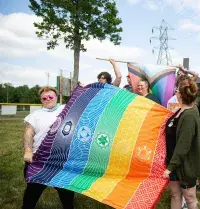
In recognition of Pride Month, Strategic Communications & Public Affairs Social Media Specialist Kris M, whose pronouns are they/them, sat down with us in a candid discussion about their views on their work at TSA and on TSA’s cultural shift in the past 10 years.
How does what you do for TSA in Social Media, and what you did during your time at the Department of Homeland Security (DHS) correlate to this year’s Pride Month theme “Behind the Lens”?
As a social media professional, what we do “behind the lens” is really the underwater bulk of the iceberg of work that we do. The public doesn’t see the work that goes into developing strategy and creating a unique voice for an agency.
I’ve been fortunate to work on teams here at TSA and while on detail at DHS HQ, who have been willing to incorporate suggestions about making our content more inclusive. For our videos or graphics, we make sure the imagery we use (for example, a couple or a family traveling through an airport) is representative of all people. We make sure the language we use is expansive, because the traveling public and our country are woven by the threads of diversity.
You are very confident in your own skin. At what point in your professional life were you comfortable identifying as “they/them?”
I’ve been out as a trans person for almost 10 years, but the confidence didn’t come overnight. It was a journey for me, trying to figure out where, exactly, I fit – and especially during a time when both language and understanding aren’t where they are today. Nonbinary people have always existed, but weren’t talked about as much in the mainstream in 2014. So I had to carve my own space and figure out what felt best. Through that journey, I learned how to love myself. I gained my truest sense of self and a deeper understanding about who I am and how to navigate through the world around me. I was free.
That said, it’s only been in the last couple of years that I’ve felt comfortable living as my true self in the workplace. Much of that has to do with workplace protections. There were times in the past when I worried that, as both a queer person and a trans person, I’d lose my job. Seeing the evolution of inclusion in the federal workplace helped me feel like I no longer had to compartmentalize who I am, and it made me a happier employee and a more productive worker.
I’m guessing if you’ve experienced discrimination in the workplace, it would have been more nuanced and less in-your-face blatant? Is that true? Why or why not? If so, how did you handle it?
The discrimination that I have and continue to face is subtle. It happens every time someone uses the wrong pronouns, either intentionally or accidentally. It happens when someone uses my deadname (a term referring to transgender people who have changed their name by the name they used before their transition). It happens whenever I show up somewhere and have to worry about which bathroom I might feel safe in. Things like that might seem like a punchline, but they devalue me as a human.
A couple of years ago, I led a few informal discussions on the importance of using the right pronouns in the workplace. I was the first vice president of TSA Pride and used that opportunity to educate as many people as would listen. It made a tremendous difference with the teams I work with, and the acceptance I’ve seen at TSA and across DHS has been outstanding.
How has the workplace evolved over the past 10 years in accepting who you are? Has that mirrored the evolution in society as a whole?
I’m so proud of the changes that have been made in the federal workplace in the last 10 years. I’ve been a member of DHS Pride since the start and seeing new chapters pop up across the country has been so incredibly awesome. There’s literally zero downside to being a more inclusive workplace, and there are so many great opportunities to connect and share resources among the LGBTQIA+ workforce that we haven’t seen until recently.
I’d like to say that society as a whole has echoed this progress, but collectively, I’m not so sure. I’m so deeply fortunate to live in Vermont, which has one of the highest percentages of LGBTQIA+ people in a state where queer and trans rights have been enshrined. But there have been actions taken across the country that target our community. Hate crimes against LGBTQIA+ people have increased exponentially. These things break my heart every day.
Finally, what would you say to people who are having a hard time adjusting to nonbinary pronouns in the workplace?
There’s a learning curve with everything, right? If you haven’t used they/them pronouns with someone before, or if you knew someone before they transitioned and they’re now using different pronouns, you will make mistakes. What matters is that you’re consciously making the effort to respect people as they are, and without judgment.
By Karen Robicheaux, TSA Strategic Communications and Public Affairs


